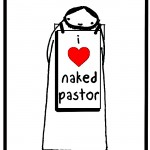I’ve been thinking about empathy. Empathy is the ability to understand and share the feelings of another. Without empathy we will never be able to enjoy dialog with one another.
I have formulated a test for myself to determine whether or not I am truly empathetic: can I sincerely express that person’s opinion or tell their story in such a way that that person would agree with it?
Here are the three scenarios I actually find myself in where this test is employed:
- The church I was pastoring went through a devastating church split in 1997. It was a horrendously destructive to so many relationships. The church, even though it survived… barely… will always bear the gruesome scars from that crisis. I have kept a journal for decades, so I have a carefully documented report of the ordeal. And I have to tell you: it is a bizarre story that would make a Frank Peretti novel read like non-fiction. But I have withheld sharing that story because I realize it is just from my perspective. Of course. I am waiting for when I can tell the story and it be appreciated even by those who I believe were the antagonists. They believe they were sincere and innocent. If I can’t write the story with that dynamic at work, then I will have failed to tell the whole story.
- The second scenario that requires empathy from me is this blog. I am particularly concerned with how I can be in dialog with those who have strongly differing beliefs than I do. How can I create a space where liberals, moderates, skeptics, agnostics, atheists, evangelicals, and fundamentalists can communicate? How can we continue with a conversation that has obviously become emotionally charge because our prized positions are at stake? This, I am convinced, requires empathy. If I can’t understand and articulate with sincerity a fundamentalist’s position, then I have failed to contribute to true dialog.
- The third scenario that I believe requires empathy is the situation in the world today. We are witnessing a more intense polarization of religious positions. We are seeing the polarization of Arabs and Jews, Muslims and Christians, fundamentalists and moderates and liberals, atheists and believers, and so on. I believe that it is incumbent upon us all to understand and even empathize with the opposite party. For instance, I think it is extremely necessary for Christian fundamentalists to understand Islamic fundamentalists and vice versa. I think it is critical for believers to understand atheists, and vice versa. And so on. Until this begins to happen, we will never get to a place where we can actually empathize with our polar opposites and perhaps come to a place of agreement where eventual peace will be made manifest.
It is basic psychology that what we hate most in others we are often most blind to in ourselves. It is called transference: where we impose upon our “enemy” the attributes about ourselves that we refuse to recognize. It is a healthy, important and urgent step for us all to take in order to enjoy the unity that is ours to have.
This is empathy 101.











